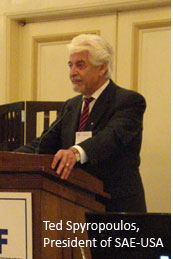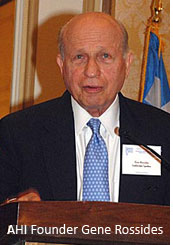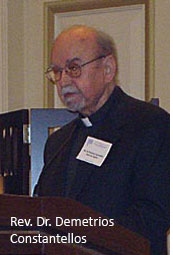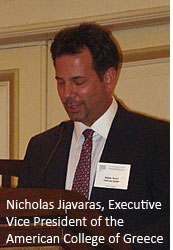Featuring over 20 prominent speakers drawn from the Greek American community nationwide, conference presentations analyzed key issues including the future of Greek American organizations, the political process and lobbying, religious and ethnic identity, promoting Hellenic culture through business, Greek education, and perspectives from young Greek Americans. Speakers also identified how Hellenism could be promoted into the future through these various channels.
AHI Executive Director Nick Larigakis opened the conference with an overview of the Future of Hellenism in America Conference’s history and overall mission to “exist as a forum for discussion that we hope plants the seed for attendees to take forth these ideas and spread them to their local communities.”
Conference Chair Spiros Spireas, Ph.D., who is Chairman and CEO of conference sponsor Sigmapharm Laboratories, LLC in Bensalem, Penn., welcomed attendees to the event. To provide context for the event’s significance, Spireas pointed out that “This conference is of tremendous value and a tremendous initiative… It should be used as a way to lead and maintain our tradition of Hellenism in the world and here locally.”
The opening keynote address on “The Now and Future of Greek America” was delivered by Professor Dan Georgakas, Director of Greek American Studies at Queens College-CUNY’s Center for Byzantine and Modern Greek Studies. Georgakas provided an overview of both positive and negative trends and statistics regarding the strength of the Greek American community’s identification with its Hellenic roots. While marriage outside the community has increased and the instances of Greek language spoken in the home has virtually disappeared except among immigrants and their children, Georgakas asserted that, “there are dynamic new factors in progress” that provide a counter-push.
Cyberspace has provided a medium through which Greek Americans can connect and reconnect with their culture through ever-increasing methods, for instance. Online social networks are proliferating, bringing people in touch with each other and with news from the homeland, irrespective of geographic location and on a real-time basis. These elements have inspired “Neo-Hellenism,” according to Georgakas, in which Hellenism is based more on cultural identification rather than geographic location.
“In some ways, I’m closer [to Greece] than my parents were,” pointed out Georgakas, himself a child of immigrants. He added that, “many people who came earlier had a gap in connection [with Greece]. This no longer exists, so new immigrants are closer and can remain closer to their families.”
 Theodore G. Spyropoulos, President of SAE-USA, provided an overview of the organization’s mission to represent and unite the nearly seven million Greeks abroad who are dispersed over seven regions around the world. Underscoring that Greek American youth is a focal point of the organization, SAE launched the SAE USA Youth Network with the goal of reaching out to young Greek Americans and getting them more involved in the community. “The only way our youth can be baptized [into the Hellenic culture] is to visit Greece… because Greece offers a tremendous wealth of knowledge.” Greek American organizations also “need to revise who they are and what they do. We [at SAE] are here to help,” Spyropoulos concluded.
Theodore G. Spyropoulos, President of SAE-USA, provided an overview of the organization’s mission to represent and unite the nearly seven million Greeks abroad who are dispersed over seven regions around the world. Underscoring that Greek American youth is a focal point of the organization, SAE launched the SAE USA Youth Network with the goal of reaching out to young Greek Americans and getting them more involved in the community. “The only way our youth can be baptized [into the Hellenic culture] is to visit Greece… because Greece offers a tremendous wealth of knowledge.” Greek American organizations also “need to revise who they are and what they do. We [at SAE] are here to help,” Spyropoulos concluded.
 Nick Karambelas, of Sfikas & Karambelas, overviewed “The Fundamentals of Participating in the U.S. Political Process”. The two components of political participation are strategy and tactics. As a community, “we have to have clearly defined objectives,” advised Karambelas. On the tactics component, he said “what we must emphasize now are the three W’s – wealth, work and wisdom.”
Nick Karambelas, of Sfikas & Karambelas, overviewed “The Fundamentals of Participating in the U.S. Political Process”. The two components of political participation are strategy and tactics. As a community, “we have to have clearly defined objectives,” advised Karambelas. On the tactics component, he said “what we must emphasize now are the three W’s – wealth, work and wisdom.”
Congressman Gus Bilirakis overviewed how Greek American issues are currently represented in U.S. Congress, and by whom. Currently, there are four Greek Americans in Congress with 141 members in the Congressional Caucus on Hellenic Issues in the 110th Congress.
 Gene Rossides, founder of AHI, spoke on “The Role of the Greek American Community in Support for U.S. Relations with Greece and Cyprus and Why This Is Important”. According to Rossides, “the future of our community depends on how involved we are in the political process” as it applies to foreign policy and decisions made about Greece and Cyprus. Rossides concluded by stating that, “our relations with Greece and Cyprus are important to the U.S., and to that extent, we [as community members and citizens] need to get involved in the political process, and get young Greek Americans involved.”
Gene Rossides, founder of AHI, spoke on “The Role of the Greek American Community in Support for U.S. Relations with Greece and Cyprus and Why This Is Important”. According to Rossides, “the future of our community depends on how involved we are in the political process” as it applies to foreign policy and decisions made about Greece and Cyprus. Rossides concluded by stating that, “our relations with Greece and Cyprus are important to the U.S., and to that extent, we [as community members and citizens] need to get involved in the political process, and get young Greek Americans involved.”
 Rev. Dr. Demetrios J. Constantelos spoke on “The Challenges Facing the Greek Orthodox Church in America.” He identified five major challenges: doctrinal, ethical, liturgical, mixed marriages and conversions to the faith. Doctrinal challenges currently faced by the Church include agnosticism, secularism and a broad variety of creeds that “confuse and leave young people to question the [Greek Orthodox] faith,” points out Constantelos.
Rev. Dr. Demetrios J. Constantelos spoke on “The Challenges Facing the Greek Orthodox Church in America.” He identified five major challenges: doctrinal, ethical, liturgical, mixed marriages and conversions to the faith. Doctrinal challenges currently faced by the Church include agnosticism, secularism and a broad variety of creeds that “confuse and leave young people to question the [Greek Orthodox] faith,” points out Constantelos.
On ethics, the Church has outlined rules which are disregarded at an increasing frequency. On liturgical practices, Father Constantelos pointed to a dismaying low rate of participation in the Church community on the part of Greek Americans, citing a growing differentiation being made between being Greek and being Greek Orthodox and a disturbing trend on the part of the clergy to drop “Greek” elements from the Orthodox faith. And while many mixed marriages – even those blessed in the Church – rarely stay in the Church, those converting to the faith often do not have the depth of appreciation for or knowledge of the Greek language and culture to see how intrinsic a part it is of the Greek Orthodox faith, Father Constantelos pointed out.
Professor Van Coufoudakis spoke on “The Importance of Increasing Modern Greek Studies Programs and Expanding the Curriculum”. After providing an overview of the current state of modern Greek studies in America, he offered advice to the Greek American community on how it can proceed more effectively in establishing additional modern Greek studies programs at universities throughout the United States.
American universities currently host 25 modern Greek studies programs, witnessing also the rise of Greek American studies. According to Coufoudakis, many programs have become repositories information, attracting visiting scholars. However, programs often “face funding, organizational and staff problems,” and we need to “think creatively on how we can assist these programs.”
 The conference was sponsored by Sigmapharm Laboratories, LLC, and held in cooperation with the Alexander S. Onassis Public Benefit Foundation (USA), the World Council of Hellenes Abroad (SAE) U.S.A. Region, and the Behrakis Foundation. Co-sponsors of the conference included the Hellenic American National Council, the Federation of Hellenic American Societies of Philadelphia and Greater Delaware Valley, the Greek American Chamber of Commerce (Greater Philadelphia Chapter), the Hellenic Lawyers Association of Philadelphia, the Hellenic Medical Society of Greater Philadelphia, the Hellenic University Club of Philadelphia, the U.S.-Greece Business Advisory Council and the Hellenic News of America.
The conference was sponsored by Sigmapharm Laboratories, LLC, and held in cooperation with the Alexander S. Onassis Public Benefit Foundation (USA), the World Council of Hellenes Abroad (SAE) U.S.A. Region, and the Behrakis Foundation. Co-sponsors of the conference included the Hellenic American National Council, the Federation of Hellenic American Societies of Philadelphia and Greater Delaware Valley, the Greek American Chamber of Commerce (Greater Philadelphia Chapter), the Hellenic Lawyers Association of Philadelphia, the Hellenic Medical Society of Greater Philadelphia, the Hellenic University Club of Philadelphia, the U.S.-Greece Business Advisory Council and the Hellenic News of America.